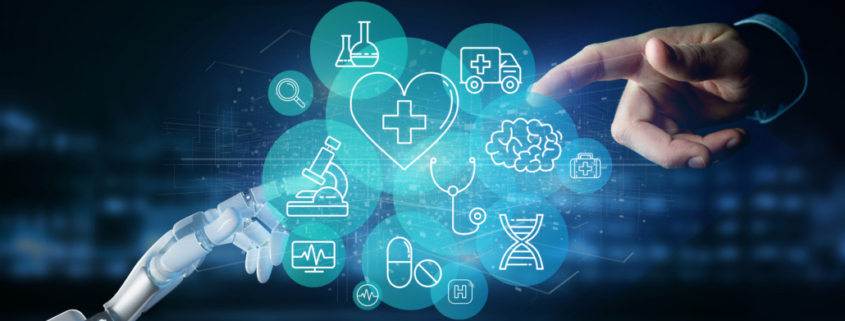CUSTOMER EXPERIENCE AUTOMATION – THE NEXT BIG THING IN HEALTHCARE?
‘Customer experience is everything, especially for healthcare businesses. However, there seems to be a gap between healthcare providers and their consumers.’ BARE shares an article for Managed Healthcare Executive on CX automation in healthcare.
‘Customer experience is everything, especially for healthcare businesses.
However, there seems to be a gap between healthcare providers and their consumers. Studies show that 81% of patients are unsatisfied with their healthcare experience.
While consumers believe their experience with a specialist should be as important as its products and services, they also think healthcare providers are more focused on industry needs than their patients’ needs.
To address this gap, healthcare providers have started automating their customer experience (CX). These digital innovations include using artificial intelligence (AI), big data, and machine learning (ML).
WHAT IS CUSTOMER EXPERIENCE AUTOMATION?
CX automation is the use of technology to replace humans in guiding and helping customers with simple tasks to improve interactions.
CX automation uses different technologies and systems to improve their overall customer service, including faster response time, and more efficient record-keeping, schedule, and payments.
Intelligent automated systems in managing patient data, finances, and schedules minimize possible human errors in patient-doctor interactions. With cloud-based data management tools supporting these systems, patient records are now more consistent, accurate, and easy to process.
BENEFITS OF CX AUTOMATION IN HEALTHCARE
With the constant rise of the digital age, medical organizations can now use more affordable and reliable intelligent tools for their operational processes. Here are the ways healthcare providers will benefit from customer experience automation moving forward:
IT ENHANCES PATIENT EXPERIENCE
With advanced healthcare automation solutions, patients are bound to experience more convenient, consistent, and personalized services from their medical providers. These will lead to minimal frustrations with their billings and appointment scheduling, too.
With AI-powered portals, patients can manage their accounts, self-schedule their appointments, and set up payment options that are convenient to them. They are also provided with automated reminders that they can see using digital devices.
As a result, patient experience will improve since they will have more control over their own healthcare needs. These innovations also encourage a more satisfying engagement between patients and their providers.
IT SIMPLIFIES DATA MANAGEMENT
With the cloud-based, AI-powered data management systems, collecting and analyzing patient data from various sources are now easier. These allow medical specialists to quickly check on current and developing trends, identify health conditions, and create better treatment strategies.
Automation also provides a virtual error-free flow of information, from planning treatments to managing routine interactions. Healthcare staff can develop timely and accurate screenings and diagnoses and can provide quick responses to the patient’s health conditions and concerns.
IT PROVIDES BETTER RESOURCE ALLOCATION
Since the staff will save more time from common and repetitive tasks, they can now allocate more efforts to other priority activities across departments.
With the predictive analytics function of AI tools, specialists can quickly determine the needs of their patients. They can determine when a patient is ready for discharge and if they need to add more resource supplies such as beds, medicines, or back-up staff for patient care.
IT RESHAPES CUSTOMER SERVICE AND ADMINISTRATION
Poor customer service leads to poor business reputation and customer experience.
With AI tools, customers can quickly connect with their medical provider’s customer service since chatbots can now answer common queries. Human agents will only interact with the customers if they have specific concerns that need specific answers and instructions.
IT IMPROVES TRIAGE
Speed is vital in providing treatment and diagnosis. AI-devices can help hospital staff to speed up the process of managing patients according to the level of their condition’s urgency.
With a systematic prioritization process, patients will know when and in what order can they address their health concerns to their specialists.
IT ENSURES COMPLIANCE TO LEGAL REGULATIONS
By using automated systems with advanced machine learning, medical providers can improve their customer experience rate while remaining compliant with the regulatory bodies that govern their services, such as HIPAA.
Healthcare businesses can manage and monitor a multitude of patient data with minimal risks from penalties for noncompliance, in terms of AI-powered systems.
IT ALLOWS A PERSONALIZED PATIENT TREATMENT
With faster and more efficient data management tools, specialists can easily understand their customers’ health history, lifestyle, risks, and potentials. Hence, they can provide accurate and personalized decisions and treatment plans for each patient.
IT’S TIME TO CUSTOMER EXPERIENCE AUTOMATION
Without a doubt, it can be expected healthcare customer expectations will grow along with digital innovations in the medical industry.
Patient satisfaction isn’t just a luxury today, but rather a necessity every healthcare provider has to prioritize.
Using automation tools and hiring a healthcare digital marketer will increase both your customer satisfaction rate and your overall brand reputation.
Adopting and getting used to these digital innovations in healthcare can be crucial, but they will bring us to a future with limitless possibilities.’
Read the original article in full here.
With the holidays coming up, here’s a gift from us to you!




Leave a Reply
Want to join the discussion?Feel free to contribute!